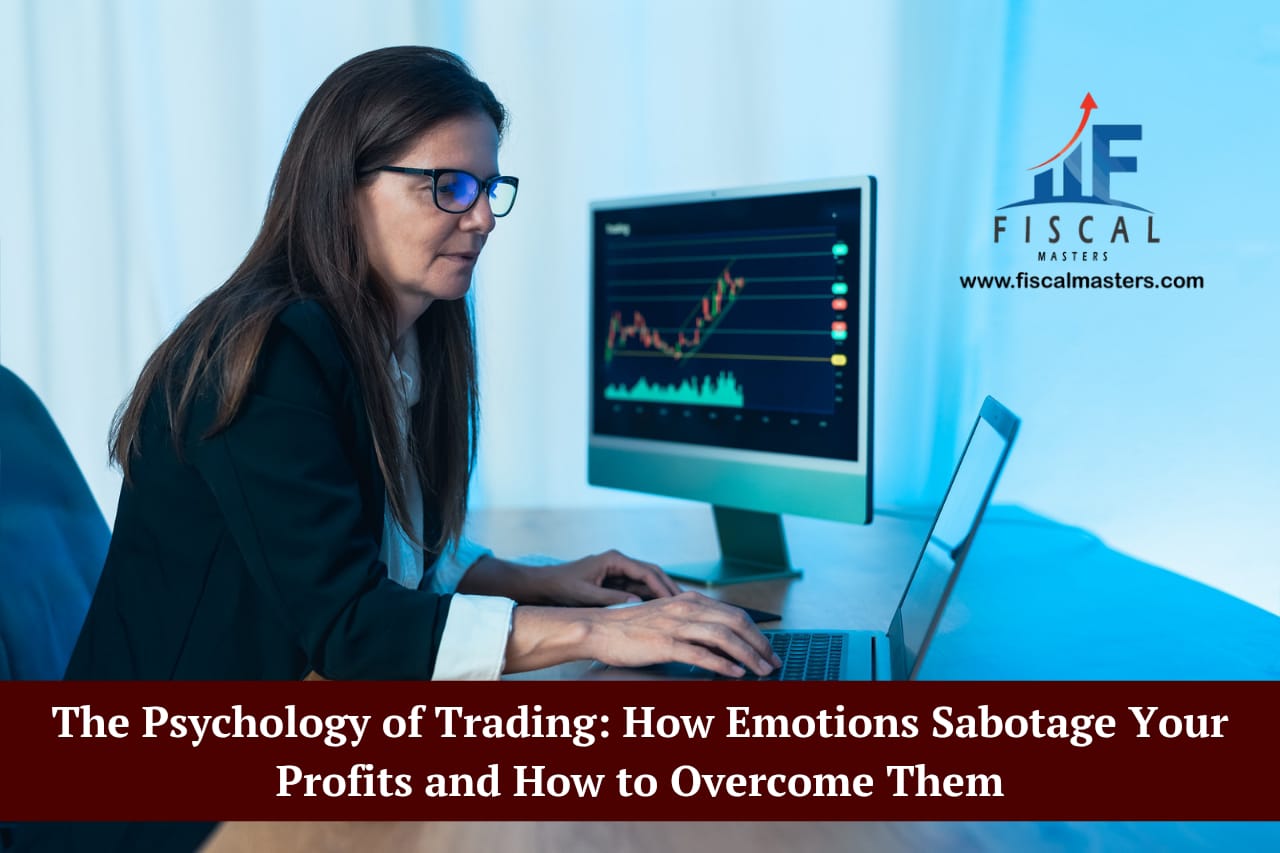Rehan, a young trader from Karachi hit the jackpot with a tech stock in 2021. He made a quick Rs. 200,000. It felt like he could do no wrong. Riding high, he doubled his investment the next morning. But then came the crash.
The stock tumbled after some fake news. Panic set in. Rehan didn’t wait or think. He sold everything. By the end of the week, he was down Rs. 450,000. The joy of profit turned into deep regret. This wasn’t just bad luck, it was the psychology of trading in action.

What Is the Psychology of Trading?
The psychology of trading is all about how your emotions guide your decisions. You may have charts, data, and plans. But once fear or greed kicks in, logic often takes a back seat. Traders aren’t machines. We all feel things like nerves, stress, thrill, and hope. Those feelings can mess with our judgment.
This article walks you through real-life emotional mistakes. You’ll see how emotions affect investing, and why the best mindset for successful trading is more than just staying positive. We’ll look at ways to stop making impulsive trading decisions, and how fear and greed in stock markets cloud your thinking.
You’ll also learn how trading discipline and patience can save your wallet. Finally, we’ll unpack some tricky tricks of psychology of trading in investing that sneak up on you. Ready to trade smarter not harder? Let’s dive in.
Emotional Trading Mistakes
Ever held onto a losing trade hoping it would bounce back? Or jumped into a stock just because everyone else was talking about it? That’s the emotion calling the shots. Most traders don’t lose money because their strategy is bad. They lose it because emotions hijack the plan. Fear makes you pull out too early.
Greed gets you chasing profits that aren’t there. Anger can drag you into revenge trades. Boredom is sneaky. It makes you trade when you really shouldn’t. Zahra, a crypto trader, had a rule. She only bought when RSI dropped below 30. But after missing a few good rallies, she got nervous.
She broke her rule just to avoid FOMO. One wrong trade. Down 30% in a single day. These emotional trading mistakes are patterns, not accidents. Spotting them is half the battle. Breaking them is how you win. Understanding the psychology of trading becomes crucial.

How Emotions Affect Investing
Here’s a fun fact with a serious twist. A Harvard Business School study showed that emotions like anxiety and excitement change the way people handle financial risk. So when your heart races during a trade, it’s not just nerves. It’s your amygdala, the emotion center of your brain taking over.
Once it kicks in, your logic doesn’t stand a chance. That’s why even smart traders ignore their better judgment. During the 2020 COVID crash, we saw this on a huge scale. Many investors panicked and sold everything. They couldn’t take the heat. But those who stayed calm or even bought more came out stronger later. Want to protect your money? Learn how emotions affect investing. That knowledge is your mental armor.
Read more: Exploring Investment Types: The Do’s and Dont’s of Investing Your Finances – October 2024
Best Mindset for Successful Trading
Want to trade like the pros? You’ve got to think like them first. The best mindset for successful trading is a strange mix of confidence and humility. Sounds odd, right? Confidence keeps you steady when the market shakes. Humility reminds you that anything can happen.
The market doesn’t care how smart you are in real life. Paul Tudor Jones, a legendary trader, once said, “Don’t be a hero. Don’t have an ego.” In other words, don’t get cocky. Great traders don’t cry over losses. They treat them like tuition fees. They care more about doing the right thing again and again, not about scoring one big win. Building this mindset takes time.
You reflect after every trade. You notice how you felt, not just what you earned. You stay grounded, even on winning days. This mindset isn’t fluff. It’s your base. Everything rests on it.
Read more: Mastering Bitcoin Trading: Ten Definitive Tips for Beginners and Seasoned Traders – March 2024
How to Avoid Impulsive Trading Decisions
Let’s be real. Quick trades feel like a rush. That “click and hope” moment can be addicting. However, there is a price for it. You must ask yourself some difficult questions if you want to understand how to actually avoid making rash trading judgments. Is this a last-minute move or is it a component of your plan?
Before the market opened, did you give it any thought? Are you trading out of stress, boredom, or anger? Talha, a day trader in Islamabad, once saw a tweet about a penny stock “exploding.” He jumped in without checking anything. Turns out, it was a classic pump-and-dump. The stock tanked 40%.
That one decision wiped out two months of progress. If you want to avoid that trap, slow down. Have rules. Stick to them. Give your mind time to breathe. You’re not just managing money. You’re managing yourself.
Read more: What is Sustainable Investing How to Align Your Profits with Environmental Goals- January 2024
Fear and Greed in Stock Markets
The twin devils fear and greed in stock markets. Nothing moves prices more than these two emotions. Greed says, “One more trade, one more gain.” Fear yells, “Get out before it’s too late!”. In the GameStop madness in 2021, some made millions. Others lost everything. Many got greedy, stayed in too long, or bought too late.
Fear took over once prices dropped, and people bailed out at a loss. These emotions are natural. You can’t switch them off. But you can learn to control your reaction. Set clear targets. Decide in advance how much you’ll risk and how much profit is “enough.” Try not to let the noise of social media mess with your head. It only makes the fear louder and the greed stronger.
Read more: Roth IRA vs. Traditional IRA: Which Is Better for You? – March 2025
Trading Discipline and Patience
Trading success is about staying calm. That’s where trading discipline and patience come in. Iman, a forex trader, only took three trades a week. That’s it. She waited for the right setups. She didn’t chase the market. She didn’t rush. After a year, she had grown her account by 40%. No drama and stress.
Remember, trading isn’t a sprint. It’s a test of emotional endurance. You don’t have to win every battle. Just stay alive for the long game. Sometimes, the most profitable position is doing nothing until everything lines up. If you want longevity in the market, build the habit of discipline.
Master the art of patience. Because in trading, the calm mind always outperforms the restless one. Impatience makes you jump the gun. Discipline keeps you grounded. You can win more by waiting for the right shot. Sometimes, not trading is the smartest move of all.
Psychological Biases in Investing
Even the smartest traders fall for their own minds. That’s how sneaky psychological biases in investing can be. Confirmation bias makes you only look for facts that match your belief. Loss aversion makes losing feel worse than winning feels good. Recency bias tricks you into thinking what just happened will keep happening.
Overconfidence is the one that makes you think you can outsmart the market. Farhan, a seasoned options trader, got burned this way. Tech stock was rising fast, week after week. He ignored warning signs and kept buying. When earnings dropped, the stock crashed. He didn’t see it coming not because he lacked skill, but because his brain fooled him. The best fix? Stay alert. Question yourself often. Listen to other opinions. Stay open, stay sharp.
Read more: Here’s Why Emotional Decisions Ruin Trading
Real-Life Resilience
Let’s talk about Sameer. He wasn’t new to trading. He had a solid system and some early wins. But in 2022, one emotional move flipped his progress upside down. He shorted a biotech stock based on a chart pattern. Then the news hit. The stock soared.
Fear froze him. Instead of cutting his loss, he waited, hoping it would fall again. But that one mistake wiped out three months of hard work. But Sameer didn’t quit. He paused. He studied the psychology of trading, learned to spot his triggers, and changed how he approached risk. He realized that trading discipline and patience were the real secret, not luck, not timing. Now he trades with more control.
He still takes risks, but smarter ones. His story proves that mistakes don’t end your journey. They shape it. If you learn from them, you come back even stronger. That’s how you grow. That’s how you win.

Conclusion
You can have all the strategies, tools, and charts in the world. But if you don’t master the psychology of trading, your profits will stay on shaky ground. Every good trade starts in your head. The market doesn’t beat you.
When emotions get the better of you, you beat yourself. Develop the finest trading mindset, avoid emotional trading blunders, and take your time when you want to move quickly. Recognize how emotions impact investing, monitor stock market fear and greed, and develop patience and trading discipline.
Remember that when it comes to investing, those cunning psychological biases are always present. Want to grow as a trader? Don’t just analyze the market. Start analyzing you.

